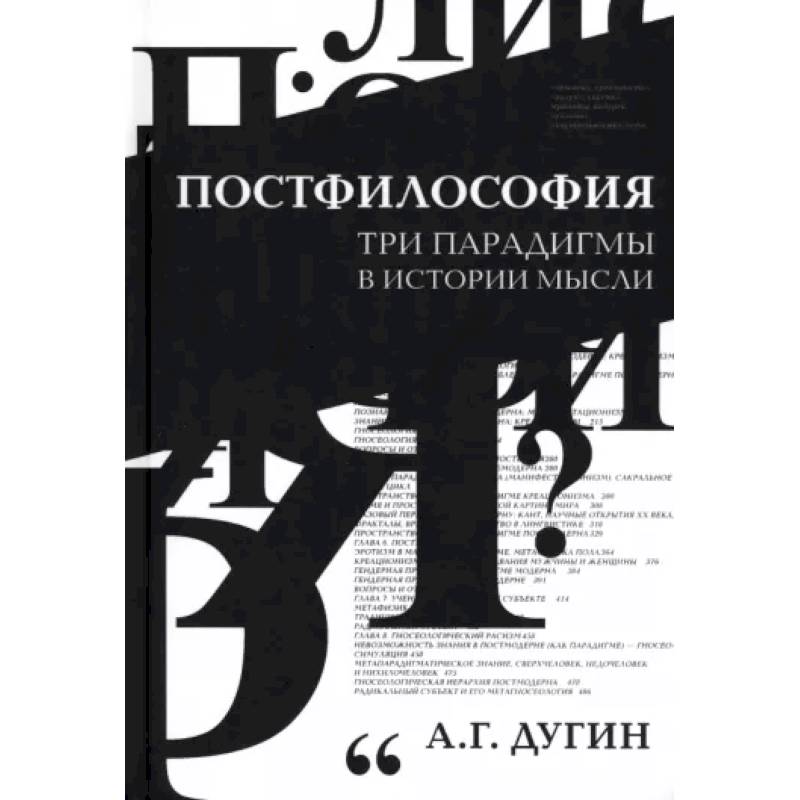Post -philosophy. Three paradigms in the history of thought
Please sign in so that we can notify you about a reply
The philosophical project "post-philosophy", according to Alexander Dugin, is designed to develop a harmonious picture of the philosophical process among readers, create a full-fledged idea of the main philosophical and historical and philosophical moments, eras and problems. To achieve these goals, A. Dugin distributes all the types of philosophical systems in three fundamental categories: the paradigm of tradition, the paradigm of modern, the paradigm of postmodern. The methodology of the three paradigms is to show how the main philosophical problems and concepts are determined, interpreted and resolved within the framework of each of the paradigms, like all philosophical schools, from ancient to modern, are distributed into three semantic zones, in each of which there is a fundamental consent Regarding central philosophical principles and categories.
There is no philosophy without the history of philosophy, and there is no history of philosophy without the history of civilizations. All this is included in the model of philosophical paradigms "premoder, modern, postmodern", which takes into account both the temporary and spatial localization of the philosophical process. The author gives a fundamental idea of what a paradigm is, what its ontological and epistemological status is deeply explored by the topos of the three highlighted paradigms: the premoder characteristic of traditional societies with their principle of sacredness and religious culture, practiced in European antiquity, the Middle Ages, and in non -European societies maintaining in touch with tradition these days, the paradigms of modernity, which has prevailed in Western Europe in modern times and has become dominant during European colonization, modernization and westernization of various societies and cultures, postmodern paradigms that have arisen in recent decades of the 20th century as criticized by modern . The author explores the transition from the Art Nouveau paradigm to the postmodern paradigm today and claims that all three paradigms are in active conflict and conflict.
clarification of the most difficult process of intersections and the struggle of the paradigm is necessary not only for those who are interested in philosophy, its history and relevance, but also for specialists of wide humanitarian knowledge, cultural strategies and socio-political examinations that are completely dependent on the paradigmatic philosophical thinking of the corresponding type
There is no philosophy without the history of philosophy, and there is no history of philosophy without the history of civilizations. All this is included in the model of philosophical paradigms "premoder, modern, postmodern", which takes into account both the temporary and spatial localization of the philosophical process. The author gives a fundamental idea of what a paradigm is, what its ontological and epistemological status is deeply explored by the topos of the three highlighted paradigms: the premoder characteristic of traditional societies with their principle of sacredness and religious culture, practiced in European antiquity, the Middle Ages, and in non -European societies maintaining in touch with tradition these days, the paradigms of modernity, which has prevailed in Western Europe in modern times and has become dominant during European colonization, modernization and westernization of various societies and cultures, postmodern paradigms that have arisen in recent decades of the 20th century as criticized by modern . The author explores the transition from the Art Nouveau paradigm to the postmodern paradigm today and claims that all three paradigms are in active conflict and conflict.
clarification of the most difficult process of intersections and the struggle of the paradigm is necessary not only for those who are interested in philosophy, its history and relevance, but also for specialists of wide humanitarian knowledge, cultural strategies and socio-political examinations that are completely dependent on the paradigmatic philosophical thinking of the corresponding type
Author:
Author:Dugin Alexander GELEVICH
Cover:
Cover:Hard
Category:
- Category:Politics & Social Science
- Category:Phylosophy
- Category:Reference books
Publication language:
Publication Language:Russian
Paper:
Paper:Offset
ISBN:
ISBN:978-5-8291-4110-3
No reviews found
